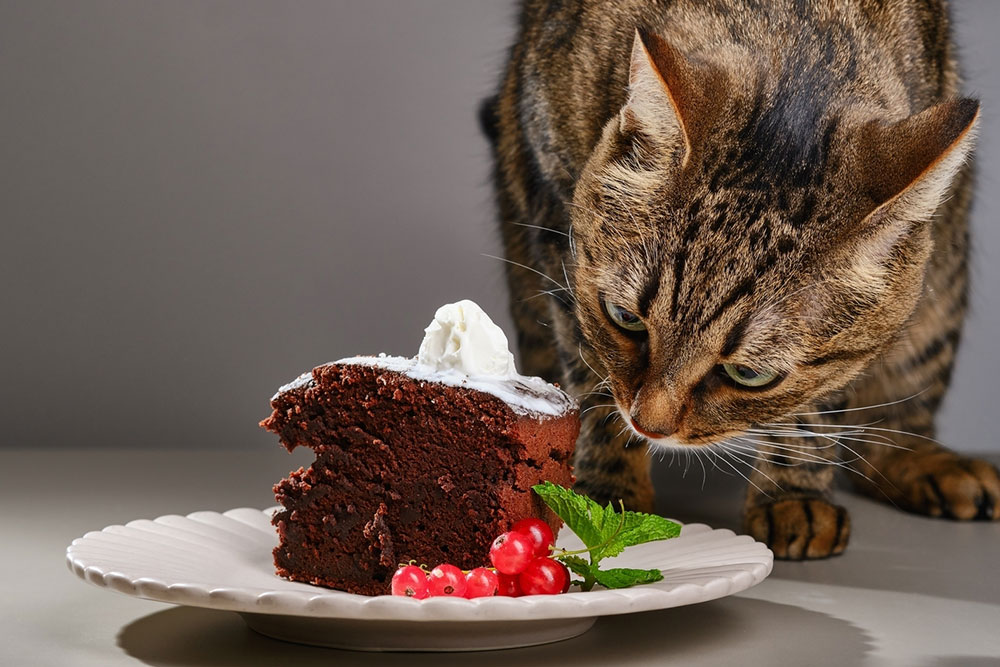Top 9 unsafe foods for cats

People with cats have to take many precautions to care for their feline friends. Some of these measures include ensuring adequate nutrition for the cats. However, to meet their pet’s exact nutrient requirements, one should ensure the cat follows a meal regimen comprising specific healthy foods that are safe for cats. The regimen should also be devoid of foods that can be toxic for cats. So, here are a few foods cat parents should avoid:
1. Chocolate
Chocolates are known to be extremely dangerous for cats, as they are loaded with sugars. Further, chocolates contain methylxanthines (theobromine and caffeine), which may trigger alarming signs like vomiting, muscle tremors, abnormal heart rhythms, seizures, and abdominal discomfort in cats. Similar properties are found in caffeinated beverages, which should also be kept far from the reach of cats. So, chocolates or cocoa is one of the toxic foods to avoid when feeding cats.
2. Raw eggs
While eggs can offer a range of health benefits for pet animals, when served in their raw or undercooked form, they can do more harm than good. Raw eggs contain bacteria causing E. coli or salmonella poisoning. Pets who contract these illnesses may experience symptoms like lethargy and vomiting. Additionally, raw eggs contain a dangerous enzyme that may damage the skin and coat of pets. So, one must ensure they cook eggs thoroughly before feeding them to cats.
3. Raw meat and fish
Similar to raw eggs, foods containing raw meat or fish should not be added to a cat’s daily meals. Uncooked or undercooked meat contains harmful bacteria that can cause food poisoning in humans and animals alike. As for raw fish, it contains an enzyme that may eliminate thiamine, a B vitamin that is required for cats to stay healthy. A food plan deficient in this nutrient could increase the risk of neurological conditions in cats, including convulsions and coma. Pet parents should also keep raw meat bones away from cats, as its intake could increase the risk of a choking hazard, damaging the cats’ teeth and digestive tract.
4. Animal liver
These days, one may find multiple liver-based treats for cats in pet stores. While these products can be fed to cats occasionally, excessive intake of animal liver may harm their health. This is because such food might trigger vitamin A toxicity, which can damage the bone density and overall well-being of cats. Here, excessive intake of animal liver could result in abnormally high levels of vitamin A that causes symptoms like deformed bones, bone growths on the elbows and spine, and osteoporosis. So, one should always consult with a veterinarian before regularly feeding a pet cat such types of foods.
5. Onions
One can choose from a variety of vegetables to add to a cat’s daily meals. But certain veggies, like onions, can be harmful to cats. Feeding the cat onions in any form (powdered, raw, dehydrated, or cooked) might break down its healthy red blood cells and trigger complications like anemia. As a result, the pet might suffer from symptoms like weakness and shortness of breath. Further, cats who eat onions regularly may develop signs like pale gums, lethargy, weakness, and urine that is dark orange in color. Upon noticing any of these symptoms, one must consult a vet immediately and get the cat examined to lower the risk of further complications.
6. Milk
While cats have often been believed to love milk, it could be harmful to their overall well-being. Milk is rich in lactose, a property that cats’ bodies may find difficult to digest. This is because most cats are accustomed to their mother’s milk as kittens, so trying to reintroduce lactose from processed milk at home might not work the same way. Additionally, if cats drink too much milk, they could experience symptoms like an upset stomach or diarrhea.
7. Grapes
Citrus fruits like grapes should not be fed to cats. Such fruits contain citric acid and essential oils that could be detrimental to cats’ overall well-being. Additionally, one should also keep the peels, seeds, and stems of grapes away from pet cats, as such parts of the fruit can cause an upset stomach, prompting a visit to the vet. Further, if cats accidentally eat several grapes, they could develop symptoms like vomiting and diarrhea and experience issues related to their central nervous systems. So, grapes and other citrus foods like oranges, limes, lemons, and clementines are some of the toxic foods to eliminate from cats’ meal plans.
8. Coconut
Coconut milk, or even its nutritious flesh, is one of the most toxic foods for cats. Too much coconut in any form could lead to severe side effects in pets. Coconut water is rich in potassium and oils that could trigger symptoms like diarrhea, loose stools, and stomach upsets. Nevertheless, small amounts of fresh coconut milk might not trigger any symptoms. Moreover, coconut oil could also help tackle certain skin conditions in pets. So, one could consider feeding coconut-based products or using its oil on their fur only after consulting a vet.
9. Bread dough
Bread is a staple food in most human households, but its dough could harm cat health. The dough contains yeasts that may inflate in the cats’ stomachs. The phenomenon could lead to a build-up of gas in the digestive system and result in signs like bloating and twisting. If this happens, one should speak to a vet to seek treatment. The yeast in bread dough may also contain other harmful properties, resulting in symptoms like breathing difficulties, vomiting, and diarrhea.
It is important to consult a veterinarian to understand a pet cat’s specific nutritional needs and accordingly develop a suitable meal plan for the cat.